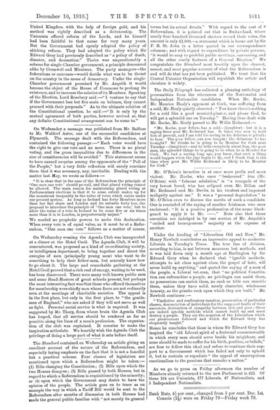The Standard contained on Wednesday an article giving an excellent
account of the nature of the Referendum, and especially laying emphasis on the fact that it is not a fanciful but a practical scheme. Four classes of legislation are mentioned upon which a Referendum might be taken :- (1) Bills changing the Constitution ; (2) Bills upon which the two Houses disagree ; (3) Bills passed by both Houses, but in regard to which a Referendum is requisitioned by the minority; or (4) upon which the Government may desire to have the opinion of the people. The article goes on to trace as an example the way in which a Tariff Bill would be sent to the Referendum after months of discussion in both Houses had made the general public familiar with " not merely its general
terms but its actual details." With regard to the cost of a Referendum, it is pointed out that in Switzerland, where nearly four hundred thousand electors record their votes, the amount is only £1,000,—a statement which is borne out by Sir F. R. St. John in a letter quoted in our correspondence columns ; and with regard to expenditure by private persons, "it would be easy to probibit public meetings, canvassing, and all the other costly features of a General Election." We congratulate the Standard most heartily upon the clearest, sanest, and most popular account of what the Referendum is and will do that has yet been published. We trust that the Central Unionist Organisation will republish the article an.l circulate it widely.


























































 Previous page
Previous page